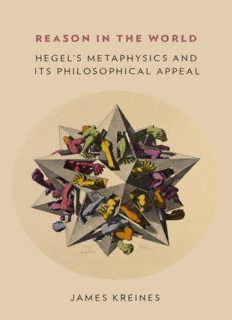
Reason in the World: Hegel's Metaphysics and Its Philosophical Appeal PDF
Preview Reason in the World: Hegel's Metaphysics and Its Philosophical Appeal
Reason in the World Reason in the World Hegel’s Metaphysics and Its Philosophical Appeal JAMES KREINES 1 1 Oxford University Press is a department of the University of Oxford. It furthers the University’s objective of excellence in research, scholarship, and education by publishing worldwide. Oxford New York Auckland Cape Town Dar es Salaam Hong Kong Karachi Kuala Lumpur Madrid Melbourne Mexico City Nairobi New Delhi Shanghai Taipei Toronto With offices in Argentina Austria Brazil Chile Czech Republic France Greece Guatemala Hungary Italy Japan Poland Portugal Singapore South Korea Switzerland Thailand Turkey Ukraine Vietnam Oxford is a registered trademark of Oxford University Press in the UK and certain other countries. Published in the United States of America by Oxford University Press 198 Madison Avenue, New York, NY 10016 © Oxford University Press 2015 All rights reserved. No part of this publication may be reproduced, stored in a retrieval system, or transmitted, in any form or by any means, without the prior permission in writing of Oxford University Press, or as expressly permitted by law, by license, or under terms agreed with the appropriate reproduction rights organization. Inquiries concerning reproduction outside the scope of the above should be sent to the Rights Department, Oxford University Press, at the address above. You must not circulate this work in any other form and you must impose this same condition on any acquirer. Library of Congress Cataloging-in-Publication Data Kreines, James. Reason in the world : Hegel’s metaphysics and its philosophical appeal / James Kreines. pages cm Includes index. ISBN 978–0–19–020430–3 (cloth : alk. paper) 1. Hegel, Georg Wilhelm Friedrich, 1770–1831. 2. Metaphysics. I. Title. B2949.M4K74 2015 193—dc23 2014035884 1 3 5 7 9 8 6 4 2 Printed in the United States of America on acid-free paper CONTENTS Acknowledgments vii Abbreviations ix Introduction: The Fundamentality of the Metaphysics of Reason 1 PART I PRIMITIVE AND MEDIATE REASONS: IMMANENT CONCEPTS FROM MECHANISM TO TELEOLOGY 1. The Dialectic of Mechanism 35 2. Against Empiricist Metaphysics and for the Concept Thesis and the Metaphysics of Reason 57 3. Kant’s Challenge and Hegel’s Defense of Natural Teleology: The Concept as the Substance of Life 77 PART II THE INESCAPABLE PROBLEM OF COMPLETE REASONS: KANT’S DIALECTIC CRITIQUE OF METAPHYSICS 4. Kant’s Dialectic Argument and the Restriction of Knowledge 113 5. The Opening for Hegel’s Response to Kant’s Dialectic 136 vi Contents PART III COMPLETE REASONS: FROM THE IDEA TO THE ABSOLUTE IDEA 6. Against the Metaphysics of the Understanding and the Final Subject or Substratum 155 7. Insubstantial Holism and the Real Contradiction of the Lawful: Chemism 181 8. The Idea: Complete Reason as Process 199 9. Free Kind for Itself: From the Metaphysics of the Absolute Idea to Epistemological Monism and Idealism 219 10. Method and Conclusion of the Logic: Dialectic, Contradiction, and Absolute Knowledge 240 Works Cited 273 Index 279 ACKNOWLEDGMENTS A portion of chapter 3 appears as “Kant and Hegel on Teleology and Life from the Perspective of Debates about Free Will” in The Freedom of Life: Hegelian Perspectives; I thank Walther König for permission to reprint these parts. I also thank the American Philosophical Society for a generous fellowship at the beginning of this project, and Claremont McKenna College for support and a research sabbatical. I am tremendously indebted to those who read the whole of the manuscript at various stages, and provided incredibly generous and insightful commen- tary: Rolf-Peter Horstmann, Paul Hurley, Dean Moyar, Robert Pippin, Paul Redding, Peter Thielke, and Christopher Yeomans. My colleagues in the phi- losophy departments of Claremont have been a source of support and phil- osophical stimulation throughout. And many others have helped me with chapters or earlier work, or have otherwise been of great assistance; they include: Mark Alznauer, Ivan Boldyrev, Luca Illetterati, Erick Jiménez, Franz Knappik, Daniel Moerner, Terry Pinkard, Tobias Rosefeldt, and Robert Stern. My heartfelt thanks to all those above; many of them have helped over many years, and have taught me by example whatever I know about the virtues of the collective practice of philosophy. Of course, any errors are my own. I thank my parents, especially for their indefatigable love and encouragement over the very long term. Finally, and yet before all, I thank Jen, Zack, and Cassandra for their love and support; to them, my deepest love and gratitude. J.K. vii ABBREVIATIONS In the body of this work and in footnotes, I provide page references, first to the German and then to the English editions of primary texts, and I separate pages of the two editions with a slash (/). Below, I indicate the abbreviations I use for the works of Kant and Hegel. I list the translations I have used, which are sparingly modified by removing capitalization of Hegel’s terminology in the English, bringing the translations of key terms elsewhere into line with the Cambridge translations of my main texts, and handling some terms (e.g., Gattung or kind) in a manner consistent with the interpretation of them I defend in the text. Hegel References to Hegel’s works in German are to the Werke in zwanzig Bänden, ed. Eva Moldenhauer and Karl Markus Michel (Frankfurt am Main: Suhrkamp Verlag, 1970). The Encyclopedia is cited by section (§) number, followed, where relevant, by “R” to indicate a “remark” (Anmerkung) of Hegel’s, or “Z” to indi- cate an “addition” (Zusatz) from Hegel’s lectures. EG Hegel’s Philosophy of Mind. 1971. Translated by W. Wallace and A. V. Miller. Oxford: Oxford University Press. Werke volume 10. EL Encyclopaedia Logic. 2010. Translated by K. Binkmann and D. O. Dahlstrom. Cambridge: Cambridge University Press. Werke volume 8. EN Hegel’s Philosophy of Nature. 1970. Translated by W. Wallace and A. V. Miller. Oxford: Oxford University Press. Werke volume 9. ix
Description: